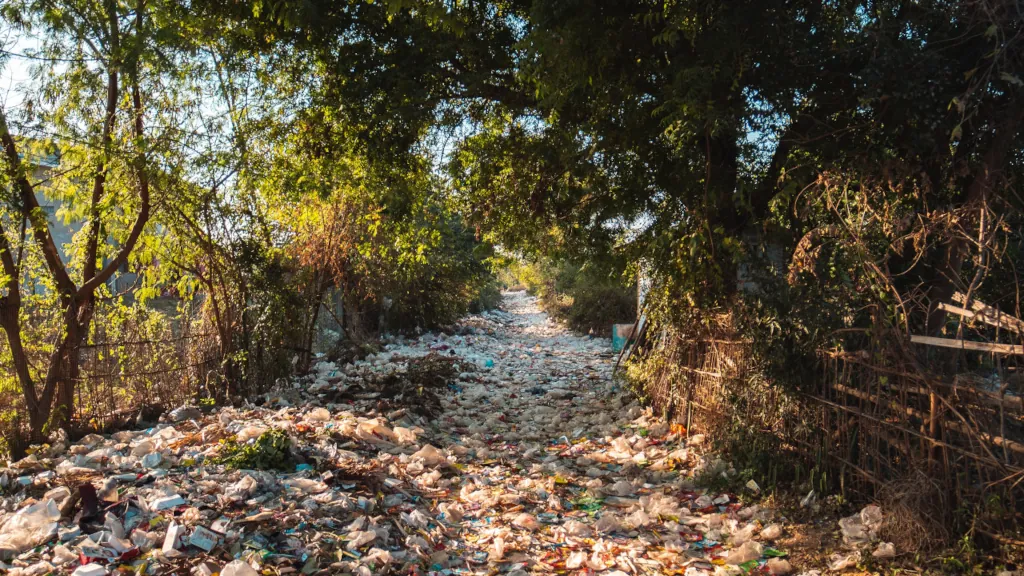Unraveling the Threads of Plastic Pollution - Fashion and Hygiene Products in the Spotlight
In this article, we will delve deep into the world of plastic pollution in the fashion industry and hygiene products, uncovering its environmental impact, exploring sustainable alternatives, and highlighting the role of brands like Cedenu in this ongoing battle. By the end of this journey, you’ll be equipped with the knowledge and solutions to make a positive impact on our planet.
The Plastic Predicament in Fashion
The Hidden Threat of Synthetic Fabrics
In the quest for affordability and convenience, synthetic fabrics like polyester and nylon have become staples of the fashion industry. But these materials come with a hidden cost: they shed microplastics with every wash, contributing to the pervasive problem of microplastic pollution in our oceans.
Fast Fashion's Legacy of Waste
Fast fashion has transformed the way we consume clothing. Its relentless cycle of production and disposal has led to overflowing landfills and discarded clothing made of synthetic materials that take centuries to decompose.
Sustainable Alternatives to Synthetic Fabrics
The fashion industry is undergoing a transformation. Sustainable materials like organic cotton, hemp, and Tencel are gaining popularity, offering a more eco-friendly and ethical choice for consumers.
The Environmental Impact
Plastic Pollution and Marine Ecosystems
Plastic pollution from fashion and personal care products poses a severe threat to marine life and ecosystems. We’ll explore the consequences of microplastics in the sea and the urgency of addressing this issue.
Health Concerns in Personal Care Products
The plastic materials in hygiene products can have detrimental effects on human health. Understanding the health risks associated with disposable products is essential for informed consumer choices.
Sustainable Solutions and Action Steps
Advocacy and Legislation
Change on a broader scale is necessary. The importance of advocating for regulations and policies that address plastic pollution in the fashion and hygiene industries is an essential part of change.
Circular Fashion as a Solution
Circular fashion aims to disrupt the traditional fashion cycle, focusing on sustainable materials, durability, and repairability. Brands like Cedenu are leading the way with circular hygiene underwear, offering eco-friendly alternatives to disposable products.
Consumer Actions to Combat Plastic Pollution
Individuals can play a significant role in the fight against plastic pollution. This section provides practical tips and steps to reduce plastic waste in your wardrobe and personal care routine.
Mindful Clothing Choices:
When it comes to reducing plastic pollution in the fashion industry, the power of consumers is immense. Start by making mindful choices when purchasing clothing. Here’s how you can do it:
Opt for Natural Fibers:
Choose clothing made from natural and sustainable materials like organic cotton, hemp, bamboo, and Tencel. These materials have a lower environmental impact compared to synthetic fabrics like polyester and nylon.
Invest in Quality:
Quality over quantity is the mantra for combating fast fashion. Invest in well-made, durable pieces that can withstand the test of time. These items may cost more initially, but they will save you money in the long run and reduce the frequency of your clothing purchases.
Second-Hand Shopping:
Explore thrift stores, consignment shops, and online platforms for second-hand clothing. Buying pre-loved items not only reduces the demand for new synthetic clothing but also extends the life of existing garments.
Minimize Clothing Waste:
The fashion industry is notorious for generating excessive waste. To combat this, consider the following actions:
Repair and Reuse:
Before discarding clothing with minor damages, explore the option of repairing them. Learn basic sewing skills or seek out local tailors and repair shops to extend the life of your clothing.
Upcycling:
Get creative with your old clothes. Transform them into new pieces or accessories. Upcycling not only minimizes waste but also allows you to express your unique style.
Clothing Swaps:
Organize clothing swaps with friends or in your community. This is a fun way to refresh your wardrobe without buying new clothes, reducing the demand for synthetic fabrics.
Responsible Washing Habits:
The shedding of microplastics from synthetic fabrics during washing is a significant contributor to plastic pollution in oceans. To reduce this impact, follow these guidelines:
Use a Microfiber Filter:
Install a microfiber filter in your washing machine to capture microplastics released from clothing. These filters can significantly reduce the number of microplastics entering the wastewater.
Wash with Care:
Wash your clothes only when necessary and in full loads. Using a lower washing temperature and gentler cycles can also reduce microplastic shedding.
Eco-Friendly Laundry Detergents:
Choose environmentally friendly laundry detergents that are designed to minimize the release of harmful chemicals and microplastics into the environment. These detergents are often biodegradable and safer for aquatic ecosystems.
Educate Yourself and Advocate for Change:
Stay informed about the latest developments in the fight against plastic pollution. Be an advocate for change by:
Supporting Legislation:
Advocate for regulations and policies aimed at reducing plastic pollution in the fashion and hygiene industries. Write to your local representatives and support initiatives that promote sustainability.
Raise Awareness:
Share information and resources with your friends and family about plastic pollution and sustainable alternatives. Engage in conversations and social media campaigns to raise awareness.
By implementing these consumer actions and making informed choices in your clothing and personal care routines, you can play a significant role in combating plastic pollution in the fashion industry and hygiene products. Remember that your individual actions, when combined with those of others, can lead to meaningful change and a more sustainable future for our planet.

The Role of Brands like Cedenu
Circular Hygiene Underwear and Sustainability
Cedenu, is committed to reducing plastic pollution in the hygiene product design. Learn more about our circular hygiene underwear and our approach to sustainability.
The Power of Community and Education
Cedenu doesn’t stop at just providing eco-friendly products. We aim to build a community and educate our customers about plastic pollution. Please read more about our plans, vision, the environmental impacts of fashion and hygiene products on our blog and website.
Conclusion
The textile industry is the second largest polluter in the world behind the oil industry. The problems caused by the fast fashion industry are far-reaching. At the end of the product-lifecycle, it mostly goes back to the developing countries where it was produced. About 60% of material in clothes contain plastic, that cannot biodegrade on the landfills and thus goes into the soil and groundwater. It also pollutes the water during wash cycles by releasing microplastic. This plastic goes through animals back into the human food chain.
By using plastic further, we do not only harm the environment and animals, but rather ourselves. Every week we eat about a plastic card accounting for 5 gramm with our food. Plastic was also found in the breast milk of mothers. Plastic can lead to allergies, cancer, infertility and heart diseases.
Needless to say that the plastic usage needs to stop. Especially in the hygienic industry disposable products and reusable underwear contain plastic that can harm the body through it’s chemicals.
That’s why we made plastic free, reusable and biodegradeable underwear for you, that can be used every day for leakage, bladder weakness or period. All that with a cirular product design that can be brought back into circulation.
The battle against plastic pollution in the fashion industry and hygiene products is an ongoing one, and it demands our collective effort. By understanding the issues at hand, embracing sustainable alternatives, taking individual action, and supporting brands like Cedenu, we can work together to create a more eco-friendly and responsible fashion and personal care industry. It’s time to unravel the threads of plastic pollution and weave a sustainable future for our planet.

